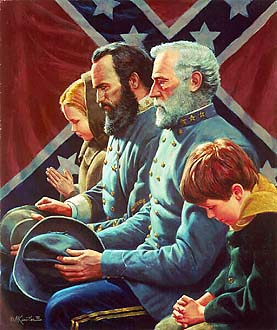Scene set at Blandford Church Hill, Headquarters, Army of Northern Virginia, 1:45pm – July 30, 1864 in The Battle of the Crater by Newt Gingrich and William Forstchen
“Finish it,” Lee said, looking at [William] Mahone. “For heaven’s sake, they are cornered. Bag the lot, and finish it. If we wait until dark they will escape. For that matter, I am stunned they have not yet brought up reserves to strengthen their line and perhaps threaten another section to draw us off. I want it finished now, before they can launch another attack and stretch us too thin to hold.”
“Yes sir.”
“And General…”
“Sir?”
“Is it true a colored division was in the assault?”
“Yes, sir.”
Lee stepped closer to Mahone and in an uncharacteristic gesture put a fatherly hand on his solider. “I want the full honor of war observed. Those who surrender are to be treated as proper prisoners, with respect, their wounded tended to, their officers shown the respect due their rank.”
Mahone looked at him, as if to reply.
“I know what our President has said, but in this army, sir, my orders on this day carry full weight. We are Christian soldiers, sir. Do you understand me? Passions must not rule, even in the heat of battle. If I hear of any atrocities, I will ensure that those involved shall face court-martial and the full penalty of military law.”
He drew Mahone a bit closer. “Do we understand each other, sir”?
There was only one answer Mahone could possibly give to such a man. “Yes, sir.” [pp. 281-82]
Of course, there is no evidence that such a conversation ever took place and there is no evidence to suggest that Lee did not know or disapprove of the slaughter of black soldiers after the battle. This is nothing less than a gross distortion of the battle even for a work of historical fiction. Why this scene is necessary for their narrative will be the subject of my review.

I wonder how much Gingrich wrote, and how much was his co-author’s..
I would imaginr in the world of the novel, no atrocities are committed.
and all the prisoners were treated with kindness and respect just as Marse Robert directed..
Newt most likely does no actual writing, he probably gives an outline of points to consider and themes to follow and then his co-author works around that.
Much the way Tom Clancy “writes” the Rainbow Six books and his other series that he supervises.
That is so bad it is laugh out loud funny.
I used to be friends with one of Newt’s ghost writers, and I take comfort in knowing that he writes better than whoever wrote this..
I wouldn’t read any of the crap Gingrich writes even if I was promised the winning MegaMillions Lottery ticket for finishing.
Anyone who uses hyperbole as often as he does in regular speech is not worth reading.
I mean, come on, how many things can be extraordinary? Its his favorite word.
I just finished it and I am glad I read it. It’s quite interesting from the perspective of historical memory and the current political scene.
Looking forward to reading your review.
Kevin,
I have read from many sources that at least toward the end of the war Lee was quite adamant about proper treatment of captured USCT soldiers. I know that quite a few sources are biased, but this does make sense to me. What I am saying has nothing to do with whether or not Lee was racist. As the commander of a large army, he would be held personally responsible for any attrocities. He certainly knew by this time that they were going to lose, and that it would happen soon. If only for his own safety and well-being he would be motivated to prevent any attrocities (yes, I no that all war is attrocity, but I am using the word in the more limited sense). If I am not mistaken, Mahone was deeply involved in a political movement after the war in which he was allies with former slaves and freedmen.
He certainly knew by this time that they were going to lose, and that it would happen soon.
Please provide a reference in Lee’s hand to support this claim. Whether Lee ever addressed the question of the treatment of USCTs is not the point. What is relevant is that he never addressed the issue at the Crater, where the execution and enslavement of black soldiers took place. I fail to see what point you are trying to make.
“That Was My Head That Just Exploded”
Last casualty of the Crater?
The authors are actually doing Saint Robert a disservice here. Since atrocities obviously were committed, then it would seem that the Gen. Lee of the novel has his orders ignored by his subordinates and, worse yet, fails to follow up on his vow to punish malefactors.
Good point, but I haven’t finished the book so it’s not clear whether any atrocities actually took place. Stay tuned. 🙂
Seeing how Lee turned the Gettysburg Campaign into a Slave kidnapping raid there is ample evidence that such a conversation wouldn’t have happened.
Ray: I’ve read “Stars in their course” and “Gettysburg” and I wonder why these esteemed authors didn’t mention this aspect of the invasion. Your comment is fascinating and makes sense.
Barf.